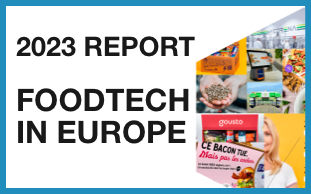Startup news and deals
🇺🇸💧Liquid Death, a US-based startup selling water in aluminium cans, raised $67M and is now valued at $1.4B. It doubles its 2022 valuation and becomes a unicorn. The success of this company is fascinating: it took the most commoditised product possible, water, and created in a few years a brand strong enough to have hundreds of its customers tattooing its logo on their bodies.
🇺🇸 🦐 Kuenhle AgroSystem, a US-based startup, raised $3M for its high-value ingredients extracted from microalgae. It wants to provide an alternative to the synthetic astaxanthin, an ingredient used for feed in aquaculture.
🇺🇸 🍼 Serenity Kids, a US-based startup, raised $52M for its baby food brand.
🇳🇿 🥛 Andfoods, a New Zealand startup, raised $2.7M for legume-based dairy alternatives developed through fermentation.
🇺🇸🔬 Tierra Biosciences, a US-based startup, raised $11.4M for its platform for designing on-demand proteins. The platform allows customers to have custom proteins developed rapidly and then delivered to them.
🇳🇱 🍼 Vini Mini, a Dutch startup, raised €500K for its products and supplements aimed at preventing food allergies in babies (by introducing potential allergens such as peanuts as early as possible).
🇱🇹🌾 HeavyFinance, a Lithuanian-based company, raised €50M to help farmers and agtech startups decarbonise and switch to regenerative agriculture.
🇩🇪 🍽️ NeoTaste, a German startup, raised €21M for its restaurant discovery app. It wants to expand in new European markets and develop new features.

🇺🇸🤖 Bear Robotics, an American startup, raised $60M for its robot waiter.
Industry news & trends
🌍 🍔 A new study looked at the impact of ultra-processed food (UPF) on our bodies and brains. It suggests that these foods act as addictive substances. UPF is also linked to the development of 32 conditions, among which mental health problems, by altering the microbiome. Many food companies (and notably producers of plant-based alternatives) are fighting against the wide definition of UPF, saying that it should be narrowed.
🇺🇸 🥩 Impossible Foods is switching its packaging to something much more “carnivorous-oriented.” Gone are the colours suggesting plants. Now, the products are covered in red with large pictures of (plant-based) meat and health claims. The company is targeting omnivorous consumers, not vegetarians/vegans, with this packaging while also emphasising the consumer’s appetite for tasty and healthy products rather than environmental concerns.








